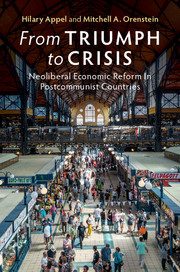23 results
Politics for Profit: Business, Elections, and Policymaking in Russia. By David Szakonyi. New York: Cambridge University Press, 2020. 350p. $105.00 cloth, $34.99 paper.
-
- Journal:
- Perspectives on Politics / Volume 19 / Issue 2 / June 2021
- Published online by Cambridge University Press:
- 21 May 2021, pp. 678-679
- Print publication:
- June 2021
-
- Article
- Export citation
1 - Triumph and Crisis of Neoliberalism
-
- Book:
- From Triumph to Crisis
- Published online:
- 20 April 2018
- Print publication:
- 10 May 2018, pp 1-32
-
- Chapter
- Export citation
Copyright page
-
- Book:
- From Triumph to Crisis
- Published online:
- 20 April 2018
- Print publication:
- 10 May 2018, pp iv-iv
-
- Chapter
- Export citation
6 - The Crisis of Neoliberalism
-
- Book:
- From Triumph to Crisis
- Published online:
- 20 April 2018
- Print publication:
- 10 May 2018, pp 142-172
-
- Chapter
- Export citation
Acknowledgments
-
- Book:
- From Triumph to Crisis
- Published online:
- 20 April 2018
- Print publication:
- 10 May 2018, pp x-xii
-
- Chapter
- Export citation
3 - Second Phase
-
- Book:
- From Triumph to Crisis
- Published online:
- 20 April 2018
- Print publication:
- 10 May 2018, pp 65-89
-
- Chapter
- Export citation
2 - First Phase
-
- Book:
- From Triumph to Crisis
- Published online:
- 20 April 2018
- Print publication:
- 10 May 2018, pp 33-64
-
- Chapter
- Export citation
References
-
- Book:
- From Triumph to Crisis
- Published online:
- 20 April 2018
- Print publication:
- 10 May 2018, pp 196-238
-
- Chapter
- Export citation
5 - Competitive Signaling and Foreign Direct Investment
-
- Book:
- From Triumph to Crisis
- Published online:
- 20 April 2018
- Print publication:
- 10 May 2018, pp 116-141
-
- Chapter
- Export citation
7 - Revising Transition Theory
-
- Book:
- From Triumph to Crisis
- Published online:
- 20 April 2018
- Print publication:
- 10 May 2018, pp 173-195
-
- Chapter
- Export citation
Figures and Tables
-
- Book:
- From Triumph to Crisis
- Published online:
- 20 April 2018
- Print publication:
- 10 May 2018, pp viii-viii
-
- Chapter
- Export citation
Index
-
- Book:
- From Triumph to Crisis
- Published online:
- 20 April 2018
- Print publication:
- 10 May 2018, pp 239-244
-
- Chapter
- Export citation
Abbreviations
-
- Book:
- From Triumph to Crisis
- Published online:
- 20 April 2018
- Print publication:
- 10 May 2018, pp ix-ix
-
- Chapter
- Export citation
Dedication
-
- Book:
- From Triumph to Crisis
- Published online:
- 20 April 2018
- Print publication:
- 10 May 2018, pp v-vi
-
- Chapter
- Export citation
Contents
-
- Book:
- From Triumph to Crisis
- Published online:
- 20 April 2018
- Print publication:
- 10 May 2018, pp vii-vii
-
- Chapter
- Export citation
4 - Third Phase
-
- Book:
- From Triumph to Crisis
- Published online:
- 20 April 2018
- Print publication:
- 10 May 2018, pp 90-115
-
- Chapter
- Export citation

From Triumph to Crisis
- Neoliberal Economic Reform in Postcommunist Countries
-
- Published online:
- 20 April 2018
- Print publication:
- 10 May 2018
Building Business in Post-Communist Russia, Eastern Europe, and Eurasia: Collective Goods, Selective Incentives, and Predatory States. By Dinissa Duvanova. New York: Cambridge University Press, 2013. 267p. $95.00.
-
- Journal:
- Perspectives on Politics / Volume 11 / Issue 4 / December 2013
- Published online by Cambridge University Press:
- 10 December 2013, pp. 1204-1205
- Print publication:
- December 2013
-
- Article
- Export citation
Capitalist Diversity on Europe's Periphery. By Dorothee Bohle and Béla Greskovits. Cornell Studies in Political Economy. Ithaca: Cornell University Press, 2012. xiv, 287 pp. Notes. Index. Figures. Tables. $75.00, hard bound. $26.95, paper.
-
- Journal:
- Slavic Review / Volume 72 / Issue 3 / Fall 2013
- Published online by Cambridge University Press:
- 20 January 2017, pp. 601-603
- Print publication:
- Fall 2013
-
- Article
- Export citation
Taxation and State-Building in Developing Countries: Capacity and Consent. Edited by Deborah Bräutigam, Odd-Helge Fjeldstad, and Mick Moore. New York: Cambridge University Press, 2008. 304 p. $90.00 cloth, $32.99 paper. - Representation Through Taxation: Revenue, Politics, and Development in Postcommunist States. By Scott Gehlback. New York: Cambridge University Press, 2008. 214 p. $80.00.
-
- Journal:
- Perspectives on Politics / Volume 7 / Issue 3 / September 2009
- Published online by Cambridge University Press:
- 19 August 2009, pp. 681-683
- Print publication:
- September 2009
-
- Article
- Export citation



